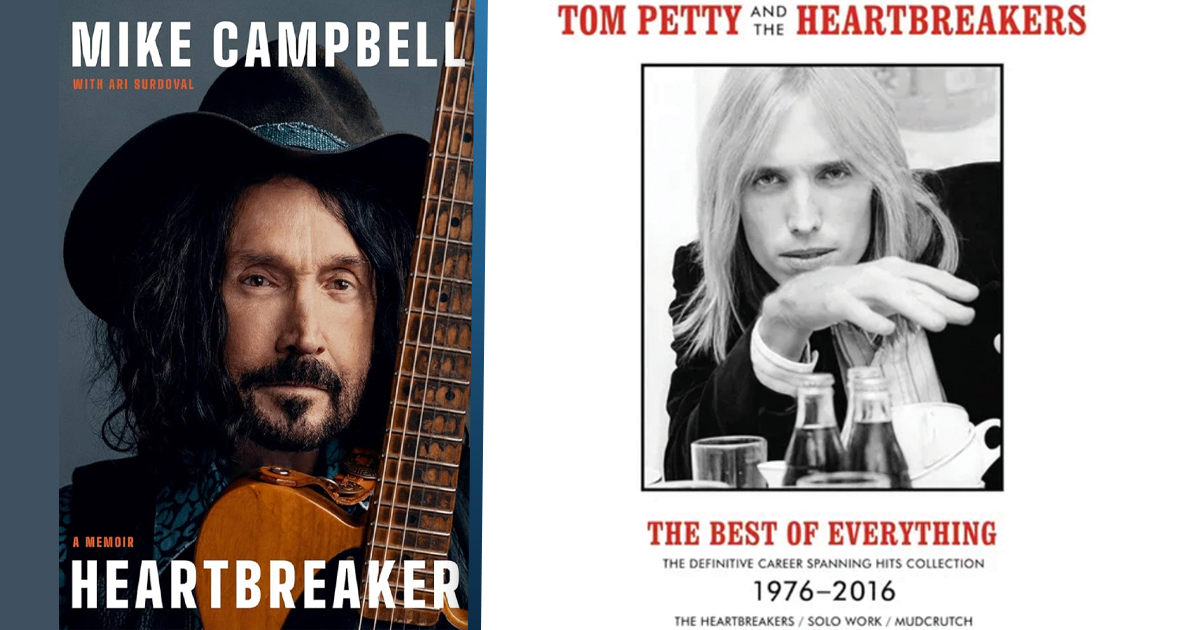
I have been a huge Tom Petty & The Heartbreakers fan since high school, when I first heard “American Girl” on the radio. Even though I was born and raised in New Yawk, I loved Tom’s folksy southern rock style and his amazing voice and songwriting ability.
When the band’s third album (and first monster hit), Damn The Torpedoes, came out in 1979, and the entire world heard singles like “Don’t Do Me Like That,” “Here Comes My Girl” and especially, “Refugee,” I was already at the University of Florida in Gainesville, Tom’s hometown, and the place where Tom first got together with Heartbreakers’ lead guitarist Mike Campbell, a guy I always felt was severely underrated in the business. I felt the same way about Miami Steve Van Zandt, who still plays lead guitar for Bruce Springsteen & The E Street Band, my other favorite live rock act.
So, when I found out that Mike and his current band, The Dirty Knobs (which he formed in 2020, or about three years after Tom passed away in 2017), were playing Ruth Eckerd Hall on Aug. 13, I bought tickets for myself and Jannah, made arrangements for a photo pass for the show (Ruth Eckerd Hall’s director of public relations Katie Pedretty has always been so fair and accommodating to me) and we stayed over in Clearwater for the night.
Katie also mentioned the possibility of — and I really was hoping to also get — an interview with Mike, especially in light of the fact that he had just had his book, Heartbreaker: A Memoir, released the same week as the Ruth Eckerd show by Grand Central Publishing. I ordered a copy on Amazon, received it two days before the concert, and had read the first 150 or so pages by time we arrived in Clearwater to see Mike & The Dirty Knobs perform. I’ve already reviewed the concert online, but couldn’t yet review the book at that time because I hadn’t yet finished it.
But, Heartbreaker…what an absolutely amazing read! Mike talks about his tough upbringing in a run-down north side neighborhood in Jacksonville, FL, called Sherwood Forest. He says he loved his father, Malcolm Campbell, who loved Johnny Cash and was in the Air Force. But, not long after his father got transferred to Okinawa, Japan, he stopped sending Mike’s mother Helen money. The family had to move multiple times and Mike said all he had were two shirts, one pair of jeans and a pair of old sneakers, “but all I wanted was a guitar.”
Naturally quiet and shy, Mike said he was always the new kid at school as his family kept moving around, but his father eventually sent him a cheap Japanese guitar and he learned how to play from a “Learn to Play” book by Beach Boys guitarist Carl Wilson, even though Mike couldn’t read music. Despite his shyness, he somehow maintained straight As and his high school guidance counselor helped him earn a scholarship to U-F.
He eventually met Tom when he heard the original lineup of Tom’s band Mudcrutch play in a local bar in Gainesville and then saw a “Help Wanted” ad posted in the local music store that “Mudcrutch Needs…” and both Mike and the drummer he had been living with, Randall Marsh, were asked to join the band.
The book then chronicles the years of struggles of Mudcrutch, which became popular as a cover band that played bars that doubled as strip clubs, including a famous one called Dub’s, where each member of the band got paid $100 a week — more money than Mike says he had ever seen in his lifetime up to that point. But of course, Tom Petty wanted to play his original songs, which wasn’t what Dub had hired them to do.
Mike recounts these stories and more about Mudcrutch’s struggles as a talented band that never quite made it. There were personality conflicts, money problems and a first record that didn’t sell. And, the one record company that was interested only wanted Tom Petty. But, Tom insisted that Mike be included in any deal.
Eventually, they let Mudcrutch go, but soon, Tom and Mike reconnected with drummer Stan Lynch, bassist Ron Blair and keyboard player Benmont Tench, all of whom they knew from Gainesville.
But, even the debut, self-titled album of the new Tom Petty & The Heartbreakers struggled to find an audience. Only the song “Breakdown” cracked the top-40, while the anthem that would become even bigger later on, “American Girl,” never did.
The Heartbreakers’ second album, You’re Gonna Get It, also failed to find an audience of significant size, but Petty and his bandmates knew they were getting closer. Personality clashes, especially between Petty and Lynch, nearly derailed the band, but once the songs from Damn The Torpedoes started hitting the airwaves, the Heartbreakers quickly became one of rock’s biggest and most sought-after acts.
Campbell and Surdoval do an amazing job of bringing you deep inside the band’s rise to stardom, including the lawsuit between MCA Records and Petty that could have kept Damn The Torpedoes from ever being released, if not for Petty himself finding the loophole he needed and the courage to stand up to MCA and the group’s original manager Denny Cordell, and getting them to settle the lawsuit.
Heartbreaker also provides insight into the making of every album that came after Torpedoes, including Tom’s first “solo” (in quotes because Campbell and nearly all of the other Heartbreakers also played on it) album Full Moon Fever, which included the monster hits “Free Fallin’” and “I Won’t Back Down.” It was on Full Moon Fever that Tom began working with former Electric Light Orchestra frontman (and fellow future Traveling Wilbury) Jeff Lynne as his producer.
The book also gives amazing insights into Campbell’s now-50-year marriage to his wife Marcie, Petty’s divorce from his first wife Jane and his second marriage to his wife Dana, the band’s use of drugs, especially cocaine, the abuse of heroin by bass player Howie Epstein (who replaced Blair in the band) and, for a while, by Petty himself, Tench’s drinking problem and even Campbell’s one-time overdose on amphetamines, which landed him in the hospital.
The chapters about the Traveling Wilburys — George Harrison, Bob Dylan, Roy Orbison, Lynne and Tom —as well as Mike’s work with the Eagles’ Don Henley (Campbell wrote the music for Henley’s solo hit “The Heart of the Matter”), and co-writing, with Tom, the huge hit Stevie Nicks (of Fleetwood Mac fame, of course) song “Stop Draggin’ My Heart Around” are all told from Mike’s unique perspective.
But, through all of these trials and tribulations — and huge successes — Campbell and Petty endured together, not only as lead guitarist and lead vocalist, but as a powerful songwriting duo. Mike explains how his songwriting process was completely different than Petty’s and that he composed at least pieces of dozens of songs that never made it onto a Heartbreakers or Petty solo album. Many of those compositions by Campbell did, however, end up as part of the three Dirty Knobs albums (so far, at least).
The story about the Heartbreakers’ final tour and final performance at the Hollywood Bowl in 2017 — only days before Petty passed away from an accidental overdose of painkillers, after he played the final shows of that tour with a broken hip — is absolutely a gut punch. Campbell says he finally told his long-time friend and partner, “I love you, brother” as he held Petty’s hand shortly before Tom passed away.
The book also talks about Mike touring for two years as the replacement guitarist for Lindsey Buckingham in Fleetwood Mac after Tom’s passing, and how Nicks got Mike together with her vocal coach.
And, there also are chapters about Mike’s time as the primary songwriter and lead singer in his band The Dirty Knobs, which basically brought me right up to date just days after seeing the wonderful concert which featured more songs by the Heartbreakers (11) than by The Dirty Knobs (8).
I’ve tried to touch on as many periods as possible in the amazing life of Mike Campbell without giving away the entire story. Whether or not you’re a fan of Tom Petty & The Heartbreakers, Heartbreaker: A Memoir is a true page-turner.
I picked up my hardcover copy of it on Amazon.com.





